TRAVEL GUIDES
Travel Information
Travel Information
Mauritania Travel Guide

General information
- visa : are easily to get in the Mauritanian Consulate in Casablanca (no longer in Rabat !) for 100Dh (= 10 euro). See my Morocco report for more information on getting the visa there. 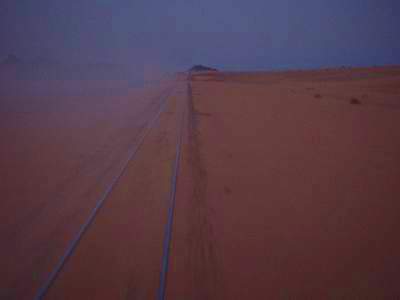 - getting there : There are at least 3 charter flights a week in high season (okt-april, see zie www.point-afrique.com) to Atar and Nema from France (Paris and Marseille). There are also charter flights from the Canary Islands. These flights are cheap, around 400 euro return, and an excellent way to get right in the middle of the desert. For overlanders they are also a good and cheap way to get back home after having sold their jeep in Atar. The money for the new road between the Moroccan border and Nouakchott seems to be collected and there are hopes that by 2006 North-Africa will finally be connected by asphalt with Black Africa.
- getting there : There are at least 3 charter flights a week in high season (okt-april, see zie www.point-afrique.com) to Atar and Nema from France (Paris and Marseille). There are also charter flights from the Canary Islands. These flights are cheap, around 400 euro return, and an excellent way to get right in the middle of the desert. For overlanders they are also a good and cheap way to get back home after having sold their jeep in Atar. The money for the new road between the Moroccan border and Nouakchott seems to be collected and there are hopes that by 2006 North-Africa will finally be connected by asphalt with Black Africa. - changing money : Mauritania is still mainly a cash only country. We did not see any ATM’s. For cash and TC’s you get the best rates in Nouakchott : 1€ = 290, 1$=270 for cash and 1€=285 for TC’s. In Nouadhibou it is quite difficult to change travellers cheques; they try up to 15% commission, so you need to bargain a bit (a friend got finally 1€=260, 1$=240) on that or change your TC’s in the capital. Except in a few serious exchange bureau’s (not the ones in the market !) in Nouakchott, bargaining on rates seems to be necessary elsewhere.
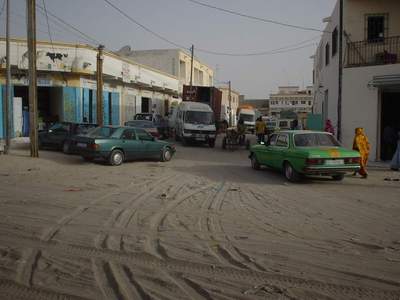 - safety : there was a little coup in the beginning of june 2003, but
the situation seemed to be very quickly again under control. In Atar we then
saw a demonstration in favour of the current president. There were warnings about
going to Nema and the east of the country as the coup leaders and followers would
be hiding there. Check the latest news on www.mauritaniapost.com. In
august 2005 there was a successful coup in which the Mauritanian army has
overthrow president Taya, which escaped to Niger. Mauritania is now ruled by
a military council.
- safety : there was a little coup in the beginning of june 2003, but
the situation seemed to be very quickly again under control. In Atar we then
saw a demonstration in favour of the current president. There were warnings about
going to Nema and the east of the country as the coup leaders and followers would
be hiding there. Check the latest news on www.mauritaniapost.com. In
august 2005 there was a successful coup in which the Mauritanian army has
overthrow president Taya, which escaped to Niger. Mauritania is now ruled by
a military council.- season and climate : high season is from October to March, at that time about 20 Western overland-jeeps a day cross into Mauritania from Morocco plus the above mentioned charter flights. During the summer months there are almost no tourists (less than 1 overland car a day crosses the border), even in touristy Chinguetti you don’t see any other tourist. But we had to admit that, unless you stay the whole time in an air-conditioned overland vehicle, the temperatures of 45-50 degrees (day and night ! in Marrakesh it cools down at night, not in the Mauritanian desert) combined with the hot wind (the faster the pickup drives, the hotter it gets in the back !) in the inner country are not made for average humans like us. A camel ride seemed simply not possible in this heat, even the Mauritanian organisers proposed a siesta between 10am and 5pm. On the coast, fortunately, the climate is a lot better. In Nouakchott and Nouadhibou it was very windy and around 25 degrees when we were there in June. This makes the beach-route and a visit to the banc d’Arquin well possible in summer.
- water : tap water is very drinkable, especially in the desert where it comes from springs. Unfortunately the water that runs out of the tap in the desert has very often 50 degrees so that you have to put it in the freezer of the guesthouse to make it drinkable. A bottle of 1.5 litres in a shop costs 180-250 UM.
- food : it is very easy to find camel meat in Mauritania, and in a lot of places in the desert, camel meat with onions and couscous or rice will be about the only thing available. Try to buy all vegetables you can find on the market to add some vitamins to your meal or take vitamin tablets. Outside the main cities restaurants are very rare so you will mostly end up eating in your guesthouse, ask them to prepare camel steak, and to use as much different vegetables as possible. If you intend to stay for a longer time in the country (say 1 month), it could be interesting to take a camp cooking stove with you, the local food gets very boring and unhealthy after a while and it is easy to cook outside in most guesthouses. Camping gaz is amazingly sold all over Mauritania, even in Choum !!
- accommodation and hotels : most places are quite basic but clean, often big rooms with 6 mattresses on the floor without sheets, often there is hot water (but sometimes no cold water !!!). Almost all campsites have also this kind of rooms, so don’t be afraid if you have no caravan with you to check them out. One mattress costs about everywhere 1000-1200 UM. During summer some places are closed.
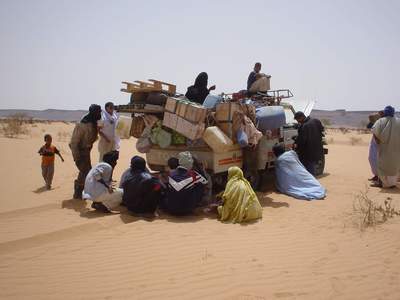 - transport : there are no buses, most transport is with Toyota Hilux. Take always the double amount of water than you expect to need, because all too often these cars have a breakdown somewhere along the way. It is also burning hot in summer and the strong hot wind dries you even more out. The strong wind also makes it sometimes impossible to keep your hat on, so it is better to use a nomad-scarf like everybody else. Try to be as early as possible at the jeep station. Most transport leaves around 9am, but if you are early you still can reserve a place inside the car. In winter it might be agreeable in the open trunk as well, but in summer the heat is really too much. The transport of goods has also priority above passengers, which means that the trunk is first fully loaded with a mountain of boxes and bags, before about 10 passengers finally can take place on the net which keeps the goods inside. Transport prices are fixed, and they never tried to cheat us, but the extra “luggage fee”, which is some kind of a tip for the driver is negotiable.
- transport : there are no buses, most transport is with Toyota Hilux. Take always the double amount of water than you expect to need, because all too often these cars have a breakdown somewhere along the way. It is also burning hot in summer and the strong hot wind dries you even more out. The strong wind also makes it sometimes impossible to keep your hat on, so it is better to use a nomad-scarf like everybody else. Try to be as early as possible at the jeep station. Most transport leaves around 9am, but if you are early you still can reserve a place inside the car. In winter it might be agreeable in the open trunk as well, but in summer the heat is really too much. The transport of goods has also priority above passengers, which means that the trunk is first fully loaded with a mountain of boxes and bags, before about 10 passengers finally can take place on the net which keeps the goods inside. Transport prices are fixed, and they never tried to cheat us, but the extra “luggage fee”, which is some kind of a tip for the driver is negotiable. - woman travellers : Mauritania is a conservative Muslim country. Relations between men and women are more restricted than in the West. Thanks to movies with for instance Richard Gere, who gets every woman in bed after about 10 minutes, some of the Mauritanian men have a bit too loose impression of how it goes in the West. And when then some Western woman don’t scream loudly when they get touched by them, in contrary to what local women would do, this image is only confirmed. My girlfriend and I also used always the words “husband” and “wife” when we talked about each other to local people, although we were not. The word “girlfriend” does not really exist in Mauritanian culture and would probably be interpreted as “loose Western woman”. If you feel uncomfortably saying that you are married when this is not the case, you could also use the word “fiancée”, which is probably the closest thing in their culture to our concept of boyfriend-girlfriend. Maybe it is even better to use “fiancée”, as you don’t have to answer any questions about why you don’t have children, ring or cannot say too much about your wedding ceremony.
- the people : not everybody will find Mauritanians “friendly people”. They are a proud people, but sometimes very stubborn, arrogant and racist. Especially their often very open and verbal racism against black workers-helpers-servants-slaves from West-Africa, which are doing the “little jobs”, was for us very shocking. Negotiating over prices in shops and for camel tours was also very difficult, as in their culture it seems that you first have to agree that you *will* buy before they want to say a first price. So I kept on asking for a starting price first to the camel drivers, while they kept on asking me to first confirm that I would certainly go with them.
- internet : you can find interesting information on the overland crossing of the Sahara on Sahara Overland and can ask questions to fellow travellers on the Horizons Unlimited Travel Forum . On SNIM Tourist Information Mauritania and Point Afrique Tours you can find some touristy information about Mauritania. Jens Finke’s book “Chasing the Lizard’s Tail” is completely readable online on Bluegecko Mauritania Travel Story, and gives a very interesting and adventurous report on his crossing by bike from Morocco to Senegal.
Nouadhibou
- Camping Asimex : the first camping you will find if you come from Morocco, a new place with clean but basic 4 bed-rooms with mattresses on the floor, 1000UM per person (800 UM in summer season if you bargain), unfortunately the owner is a very bossy and quite arrogant man and you fall a bit in his hands if you have no own transport as this camping lies about 5km from the city centre, close to the airport. He offers to bring you “for free” to the exchange office and the train, but asks (orders) afterwards money anyway.
The Iron ore Train Nouadhibou – Choum
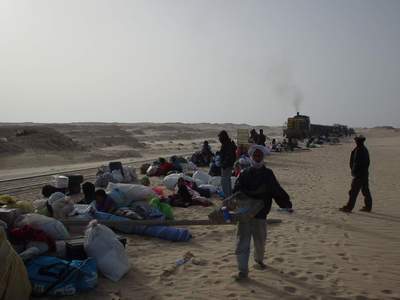 - attraction : this “longest train in the world” transports iron ore from Zouerat to Nouadhibou and can be up to 2.5km long.
There are lots of bucket wagons for the ore but just one passenger wagon, see more info on the site of the SNIM, Mauritanian railways . There are 3 trains a day, but only the one of 14.30 takes passengers (maybe if you have to transport your car as well you can take another train). It is 460km/12hrs from Nouadhibou to Choum and you can follow the distance on milestones along the track, sit at the entrance of the wagon for the nice views, there are no doors anyway.
- attraction : this “longest train in the world” transports iron ore from Zouerat to Nouadhibou and can be up to 2.5km long.
There are lots of bucket wagons for the ore but just one passenger wagon, see more info on the site of the SNIM, Mauritanian railways . There are 3 trains a day, but only the one of 14.30 takes passengers (maybe if you have to transport your car as well you can take another train). It is 460km/12hrs from Nouadhibou to Choum and you can follow the distance on milestones along the track, sit at the entrance of the wagon for the nice views, there are no doors anyway.
1st and 2nd class = apparently you have to be lucky. The reports I had read from people having done the trip in 2002, were describing the nice views of the desert through the windows. Our wagon (in summer 2003) had NO windows (except tiny holes which were closed because it was too cold). For first class there were 4 very run down and basic “beds” in a separate part of the wagon, but don’t expect any door to that little room.
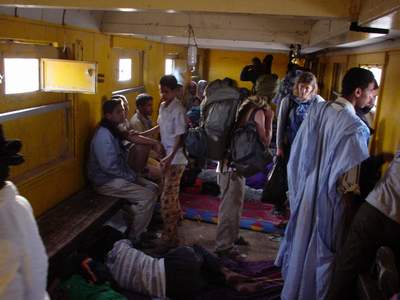 As there are only 4 places you should book in advance as early as possible (try via the SNIM website above). In second class (the rest of the wagon) there were two long wooden benches on the sides, but as we probably were with about 150 people in the wagon the floor was filled with carpets and bodies lying all over like worms. Definitely not recommended for women alone, because it is very dark in the wagon (there is no light, except for some candles up to midnight for playing cards and thereafter just a sporadic flash of a torch) and Mauritanian hands know their way, if you don’t resist loudly. My girlfriend had a scarf on and introduced me as her “husband” when she talked with men and had no problems. The girl of British couple on the contrary had a very hard night keeping hands away in the dark.
As there are only 4 places you should book in advance as early as possible (try via the SNIM website above). In second class (the rest of the wagon) there were two long wooden benches on the sides, but as we probably were with about 150 people in the wagon the floor was filled with carpets and bodies lying all over like worms. Definitely not recommended for women alone, because it is very dark in the wagon (there is no light, except for some candles up to midnight for playing cards and thereafter just a sporadic flash of a torch) and Mauritanian hands know their way, if you don’t resist loudly. My girlfriend had a scarf on and introduced me as her “husband” when she talked with men and had no problems. The girl of British couple on the contrary had a very hard night keeping hands away in the dark. 3rd class = you can also get (for free and without reservation !!) a place in one of the many open (like huge dirty steel buckets) wagons which transport the iron ore. A few hundred Mauritanians did so when we were there, they grouped themselves along the railway in small groups waiting for the wagon to stop in front of them. Be prepared for a very cold night, even in summer and take a good long scarf to wrap around your face to prevent you from inhaling too much of the iron-ore dust.
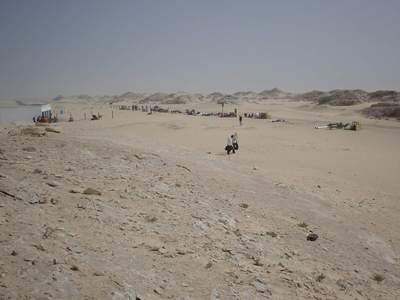 A good protective plastic bag for your backpack can also be helpful as a sleeping mat or carpet and a torch. As our second class wagon was too full and there were no windows anyway, we would probably have had a better time in one of these iron buckets.
A good protective plastic bag for your backpack can also be helpful as a sleeping mat or carpet and a torch. As our second class wagon was too full and there were no windows anyway, we would probably have had a better time in one of these iron buckets. - prices and tickets :
The ticket seller hangs somewhere around in the station building. If the train is late he goes to drink tea in the police post on the other side of the street where you have to register.
2nd class : 800 UM to Choum, 1000 UM to Zouerat, there are only 4 places so reserving in advance is necessary, see the above SNIM website. 1st class costs 2000UM to Choum I think.
- departure and arrival times : normally the train should leave at 2.30pm, but it can be delayed, we left at 6pm. If the train which comes from Zouerat has arrived late, and is still unloading, the ticket seller can predict quite precisely when it will leave. If the train leaves on time you arrive in Choum at 2.30am, when it is nice and fresh. Trucks await the train to bring you to Atar. Our train was late, which meant that we had to sleep the whole night like worms in the wagon, arrived at 7.30am in Choum, waited until the truck was loaded with goods and left finally at 10am. By then my thermometer indicated 48°C in the shadow… Above that the truck had a breakdown halfway, so instead of 4 hours, it took us 8 hours to reach Atar.
- departure of the train and the fight to get on it :
As there are not enough places in 2nd class, the whole mass attacks the train even before it has come to a halt. I tried to get in as the others did, but there was an enormous pulling and pushing and shouting.
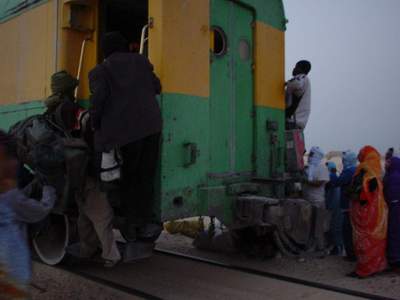 Finally a fat Mauritanian woman managed to pull me by the neck and pushed me with her ass off the stairs back on the sand. Afterwards all this hassle was of no use : with 150 passengers in the wagon nobody had space anyway. The people who had occupied a space on a bench found out that this is not the best position to sleep, better to throw a carpet on the ground an occupy a bit of floor space to lie on. Fortunately the train stops about every two hours to get some passengers off, it can be quite spectacular to see them drive of to nowhere. So after a while you will have more place. There are several strategies to get a nicer departure than I had :
Finally a fat Mauritanian woman managed to pull me by the neck and pushed me with her ass off the stairs back on the sand. Afterwards all this hassle was of no use : with 150 passengers in the wagon nobody had space anyway. The people who had occupied a space on a bench found out that this is not the best position to sleep, better to throw a carpet on the ground an occupy a bit of floor space to lie on. Fortunately the train stops about every two hours to get some passengers off, it can be quite spectacular to see them drive of to nowhere. So after a while you will have more place. There are several strategies to get a nicer departure than I had : * if you prefer to take it easy :
don’t worry about finding a seat (it did not make any difference in our case anyway), but take some nice pictures and film of the crowd fighting to get on and get on yourself in the very end, when everything has cooled down.
* if you are fast and energetic, get on before the others :
as most Mauritanians have a lot of luggage you can run faster than them. As soon you see the train at the horizon you should head for the last wagon (which is the passenger wagon) and get on before the train has come to a halt. When it has stopped it is too late ! But maybe check first if it is the wagon with the big windows or not. If it is our dark wagon, I don’t see any reason to hurry to get on, you will lie on the floor like worms anyway.
- ship wrecks : if you have some time left at the station,
 e.g. when the train is delayed, you can have a look at a bay full of deserted ship wrecks, about 15 minutes walk from the station on the other side of the road.
e.g. when the train is delayed, you can have a look at a bay full of deserted ship wrecks, about 15 minutes walk from the station on the other side of the road.
Choum
- to see, tours : nothing special, just a dusty village of about 50 houses in the middle of the desert, there are a few very small grocery shops where the sell coke and camping gaz. - transport : when the train arrives, trucks are awaiting to bring passengers to Atar for 1000UM + 150UM for luggage (after bargaining from 250UM). It can take a few hours before the pickup leaves as it first has to be filled with a mountain of goods before you can sit on top of it. We had a breakdown and arrived in Atar after 8 hours instead of 4 hours.
Atar
- to see : a dusty town with little market and grocery stores, exchange rate for euro was 290UM, same as in Nouadhibou, but probably it is very hard to change travellers cheques here. 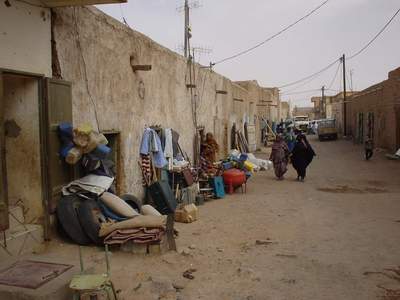 - accommodation and hotels :
- accommodation and hotels : It is extremely hot in Atar in summer and it does not cool down at night, so or you chose a guesthouse with air co (check if there really is cool air coming out of it !) or you sleep outside (in most guesthouses possible on mattresses on the roof). Sleeping inside without air co (like we did the first night) will prove to be a very sweaty and sleepless experience.
* Auberge Avrah, 022264206, behind the market, 1200pp in a room with 6 mattresses, 1900pp for the same room with the air co on. Unfortunately the air co does not work too well as the air which comes out of it starts only to cool down from the second day on. This is one of several average guesthouses.
* Bab Sahara, on the outskirts of town, owned by a Dutch man and his German wife, nice “garden” terrace with little travel library and some drinks, very clean new showers and toilets, rooms in little huts, since recently running water, can give lots of information about the region, good food (some change on the usual Mauritanian menu), no air co, 1200UM pp. Here you can buy or consult a topographic map of the Adrar region for 10 euro.
* MKT : the new hotel of the big tour company which receives most of the package charter tourist groups, 10000UM/dbl, 180000UM/dbl including food.
- internet : there is a new internet café in one of the buildings along the main road at the MKT hotel; the cyber café opposite the Alliance Franco-Mauritanienne does not work.
- transport :
 * Atar – Chinguetti : 1300pp, in the low season there is only one jeep every two days from the “garage Chinguetti”, but you can have more luck if you try on the market as we did. Some sellers come from Chinguetti for the daily market in Atar; search for them on the market rather than in the garage. If you chose to charter a jeep, it will cost you 13000UM. The drive takes 2 hrs, breakdown time not included.
* Atar – Chinguetti : 1300pp, in the low season there is only one jeep every two days from the “garage Chinguetti”, but you can have more luck if you try on the market as we did. Some sellers come from Chinguetti for the daily market in Atar; search for them on the market rather than in the garage. If you chose to charter a jeep, it will cost you 13000UM. The drive takes 2 hrs, breakdown time not included.* Atar - Ouadane : it is very hard to get there in low season, there were only two cars a week when we were there.
* Atar – Nouakchott : there are about 10 cars a day, 5 in morning and 5 in evening. It is a bit bad organised. We arrived at 4pm to leave in the evening. First we had to chose and pay one of the five cars, which all had a little bit different prices. They would not say which one would leave first. Two of the other cars left quite soon, but we had guessed wrong. At 6pm, the cars which are left start the fight how they will share the passengers which are still left. After the discussion was settled, we left at 7pm. We arrived at 2am in Nouakchott, almost 10km out of town at the ”garage Noukchott”, not more than a few (open) nightshops along the road. It took half an hour for the first taxi to pass by, and in the fight for it we won as the others did not want to pay the 800UM which the driver requested to bring us to the hotel in the centre.
Chinguetti
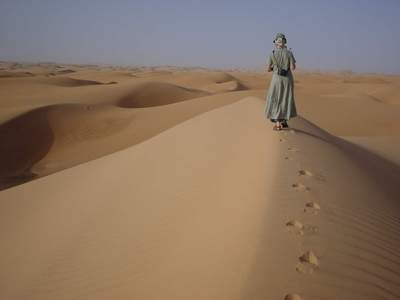 - to see : Chinguetti must be very touristy in high season, with about 30 guesthouses and money begging children and souvenir selling women, but is extremely quiet in summer. We were the only foreigners there. You can have a look at some of the libraries, have a nice walk in the ruined old village or the nearby sand dunes or rent a camel. In summer unfortunately you have to sleep between 10am and 5pm as it is too hot to do anything else.
- to see : Chinguetti must be very touristy in high season, with about 30 guesthouses and money begging children and souvenir selling women, but is extremely quiet in summer. We were the only foreigners there. You can have a look at some of the libraries, have a nice walk in the ruined old village or the nearby sand dunes or rent a camel. In summer unfortunately you have to sleep between 10am and 5pm as it is too hot to do anything else. - Auberge des Caravanes : the first and oldest auberge in town; in high season probably the one which receives most of the tour groups, but in low season we were the only ones there. Nice view from the roof, sun panels give electricity outside the village-generator hours (generator finishes at 11pm), 1200pp, 1000pp for a filling meal (couscous or tajine with camel meat).
Nouakchott
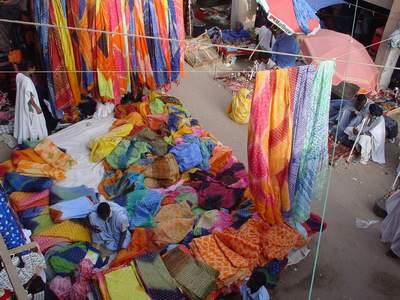 - to see : the market (Grand Marche) is extremely colourful due to the very nice fabric (around 1000UM a piece after bargaining) they sell.
- to see : the market (Grand Marche) is extremely colourful due to the very nice fabric (around 1000UM a piece after bargaining) they sell. - internet : there are several internet cafes in town, most of them are closed during siesta.
- changing money : don’t change on the market, only locals who know the price are able to bargain the price they quote (around 260UM for a euro) there up to a reasonable amount. The exchange office opposite the Saudi mosque gave 280-285UM per euro in TC, 290UM per cash euro and 270UM for a dollar. To change your UM back to dollar/euro you pay 2% commission.
- Hotel Adrar : was closed at night when we arrived from Atar, we took the hotel (forgot the name) on the back street of Adrar, and got after bargaining a big modern room with airco for 3000UM.
Nouakchott to the border of Rosso with Senegal
Chronologically : 11am : taxi Nouakchott Centre – garage Rosso
on the Southern outskirts, 500UM, 10km
12am : one of the quickly filling up group taxi’s to Rosso,
1500UM pp + 200UM luggage fee
3pm : Arrival at Rosso border
* guide : a pushy Senegalese “guide” will immediately stick on to you like glue, there is no polite way to get rid of him, so you can chose between feeling hunted the whole time or arrange a price with him for his “services”, it should not be more than 500UM, including his ferry ticket.
* village : there are some little shops and restaurants on the Mauritanian side of the border
3.30pm : Mauritanian border
* The border closes at 6pm
* The police at the entrance checked our declaration forms which you have to ask for yourself when you enter the country. They only requested the paper, not the actual amounts of imported money on it. Be sure to have this forms or be ready to pay a bribe as penalty.
* Another police agent took or passports to get them stamped inside the office, we were a bit worried that they would get lost, but he was friendly and got them back nicely stamped. We could offer him something for the work he proposed, but we smiled and said no. A motor biker which we met in Senegal told us that he was forced to pay several bribes, most over Landers therefore seem to take a border crossing further east.
4pm : Ferry
* There are only 4 (or so) ferries a day; in between there are also pirogues for about the same price 150-200UM pp which will get you to the other side of the Senegal river which forms the actual border between Mauritania and Senegal.
* tickets : there are a confusing high number of tickets to buy from different sellers before you can get on the ferry : first 2 tickets of 50UM, then one of 20UM and finally one of 30UM for the luggage; making the total sum of 150UM, so the amount is too small to worry you get cheated.
4.30pm : Senegalese border Post
* stamp : you get your stamp without bribes after a bit of pushing in front of a window. Mauritanians have to pay around 1000UM bribes, as they are hated by the Senegalese for their racist behaviour.
* money exchange : in the few shops on the Senegalese side you can get 2 CFA for 1 UM and 600CFA for one euro; bad rates (it should be 2.2CFA and 656-670CFA) so change only little.
Pictures from Mauritania
See the Mauritania photography gallery for photos, pictures and images.
More travel information on Africa
- See my Senegal Travel Guide for the rest of the story.
- If you need more information on travelling in Mauritania and Africa, check out the Africa Travel Guide.
